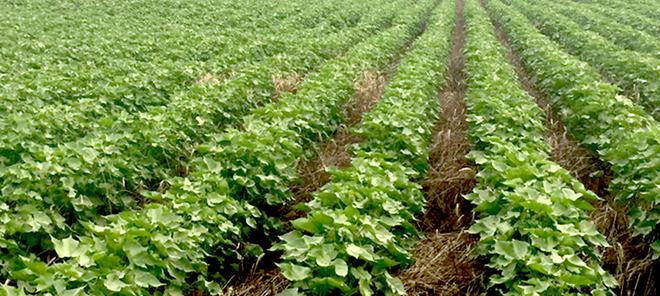
Enlist™ weed control system Adds Flexibility to Farmer’s Weed Control Program
After being an electrician and wiring battleships in World War II, Aaron Burleson’s granddad decided to move back close to where he grew up in North Carolina and buy a farm. That farm remains part of the operation today, and Burleson and his cousin are the third generation on Thurman Burleson & Sons Farm.
“We farm with my dad and uncle,” Burleson says. “We’ve expanded a lot, but we are in the same area as where our granddad started farming.”
Today, the Burlesons grow corn, soybeans, wheat and cotton. They also raise beef cows and have a brood turkey house. They grow almost 100 percent dryland cotton. With water scarcity an issue in the area, the family welcomes innovation.
“We’ve been no-till here for as long as any part of the country,” Burleson says. “We’ve no-tilled corn since the 1960s and no-tilled cotton since 1991. We’ve also no-tilled wheat close to the same time frame.”
With only a thin layer of topsoil, the organic matter that builds up from not tilling the land is especially helpful.
“We attribute a large part of our success to that,” Burleson explains. “We manage residue and try to keep the ground covered with cover crops. We also use crop rotation.”
The Enlist™ weed control system became a part of the farm’s management program to help control resistant weeds. Pigweed has expanded greatly in eastern North Carolina. Although Burleson has been proactive in dealing with it, there are spots where pressure is fairly heavy.
“And now, it’s not just pigweed. We have marestail, common ragweed, and I just saw a patch of giant ragweed,” Burleson says. “We need options to get rid of the weeds.”
For Burleson, the Enlist system is easy to work with, and the tank cleanout process is straightforward. He feels the 2,4-D choline in Enlist Duo® and Enlist One® herbicides stays where he sprays it, which is important for his neighbors’ surrounding crops.
“We do all of our own spraying. We like Enlist Duo because of the premix with glyphosate,” he says, “and Enlist One has more tank-mix options. We tank-mix acephate for thrips control. We can come back and get weeds and thrips control at the same time.”
However, the biggest advantage for the farm is no preplant interval after a burndown application.
“Weather is so unpredictable. This year, we got way behind because we had rain showers for two weeks,” Burleson says. “With the Enlist system, we can still get a burndown of an Enlist herbicide out and plant the Enlist cotton the next day.”
The Burlesons already have sprayed part of their Enlist cotton with Enlist herbicides this year and can tell the products are working on the marestail, ragweed and pigweed. They have the flexibility to make a second postemergence application with additional modes of action if needed.
